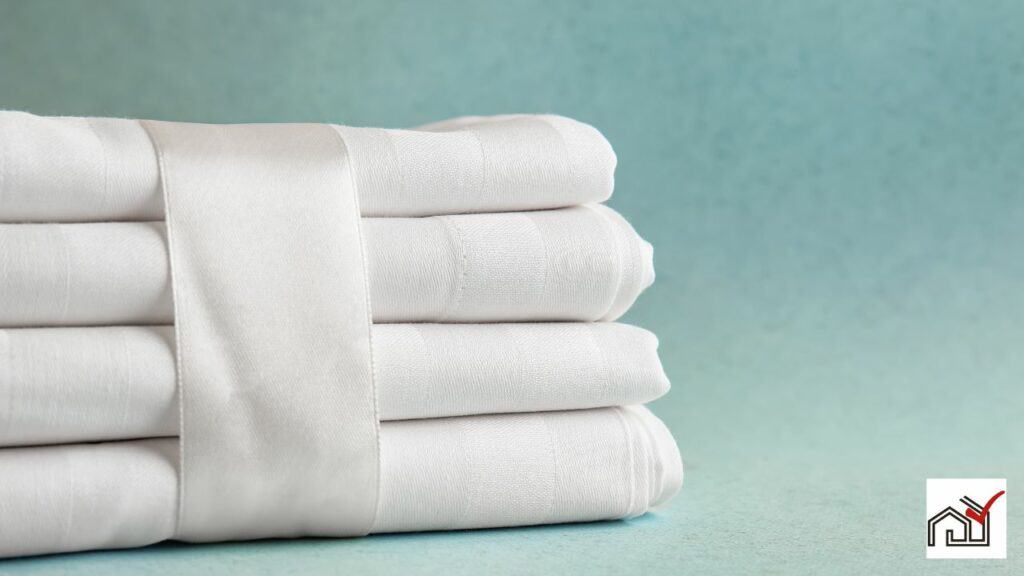Bed sheets typically last between two to six years, depending on the quality of the material, such as cotton, linen, or bamboo, and how well they are maintained. Frequent use and washing can wear them out faster, so following the manufacturer's care instructions is crucial for extending their life.
Signs that it's time to replace bed sheets include lingering smells, thinning fabric, and loss of softness.
The following information will discuss the factors that affect bed sheet durability, how to care for them, and when to consider getting new ones, highlighting the importance of investing in quality bed linens.
Sheet Lifespan Expectancy
Bed sheets typically last between two to five years. Their longevity depends on the quality of the material, how often they are used, and how well they are cared for. High-quality cotton sheets with a high thread count usually last longer. Frequent use and washing can shorten a sheet's lifespan. Sweat, body oils, and pets may also reduce the time before sheets need replacing.
To prolong the life of bed sheets, follow washing instructions carefully, which usually involve mild detergents and gentle wash cycles. Proper storage also helps to maintain the fabric's quality.
Knowing these factors helps consumers decide when to buy new sheets, maintaining comfort and the condition of their sleeping area. Proper care can extend the lifespan of bed sheets beyond the minimum expectancy.
Material and Thread Count Impact
The durability of bed sheets is largely determined by the fabric type and not just the thread count, which is often mistakenly thought to be the main factor. While a higher thread count can indicate quality, it is not the only aspect that affects how long bed sheets will last. Materials like percale and linen, which are known for their breathability and strength, can last longer than the average 2-5 years, despite regular use and washing.
Thread counts vary from 200 to 600 and can change the texture and appearance of bed sheets, but a higher count does not guarantee a longer lifespan. The durability of sheets is more accurately predicted by the weave and fiber quality. Proper care can make even lower thread count sheets last for many years, whereas high thread count sheets made with inferior fibers may wear out faster.
The sheet's lifespan is also affected by how often they are used, personal sweating, and pets. Choosing high-quality materials and following proper care instructions can improve bed sheet longevity. Bamboo sheets with antimicrobial properties are often recommended for their long-lasting nature and hygiene benefits, generally outperforming traditional cotton or linen sheets.
Usage and Durability Factors
Factors such as usage and maintenance significantly affect the durability of bed sheets. Material quality is important, but care practices play a crucial role. Regular washing can wear out bed sheets, as the washing process puts stress on the fibers, particularly with hot water or strong detergents. Using several sets of sheets in rotation can reduce the wear from frequent washes.
Body sweat and oils can also degrade bed sheets, leading to fabric thinning and tearing over time. Pets may decrease sheet life through added dirt and scratching.
To extend bed sheet life, follow the manufacturer's care guidelines, use the correct water temperature and detergent, and avoid overloading the washing machine. High thread counts usually indicate a more durable weave, but extremely high counts may be too delicate. The right balance is essential.
Care and Maintenance Tips
To extend the life of your bed sheets, follow these care instructions:
- Wash your sheets every 1-2 weeks.
- Use a gentle detergent and avoid bleach and fabric brighteners to prevent fabric damage and color loss.
- Dry sheets on a low heat setting or air dry them to prevent shrinkage and fiber damage. If using a dryer, take them out while slightly damp to reduce wrinkles and avoid over-drying.
- Rotate your sheet sets to distribute wear evenly and make them last longer.
- Store sheets in a cool, dry place and make sure they are fully dry to prevent mildew and degradation.
Signs of Sheet Wear
Certain signs indicate the need to replace bed sheets, including visible tears, holes, and stains that do not come out after washing. These defects affect both the appearance and the functionality of the sheets, as they no longer provide a smooth surface for sleeping.
Pilling, or the appearance of small fiber balls on the surface, suggests the fabric is aging and becoming rougher, which compromises the feel and durability of the sheets.
Persistent odors, even after washing, can mean the presence of mold, mildew, or fungus, which are health hazards and indicate the need for new sheets.
Over time, sheets naturally become less soft and can collect allergens like dust mites, bacteria, and body oils. Sheets typically need replacing after two years to maintain cleanliness.
The lifespan of sheets also depends on thread count and material quality. Higher thread counts usually mean more durability, but all sheets will eventually wear out. Proper maintenance can prolong their use, but one must recognize when replacement is necessary for comfort and hygiene.
Ideal Replacement Timeline
Regularly check your bed sheets to decide when to replace them, usually between two to three years, for comfort and cleanliness. The lifespan of your sheets can vary based on material, use frequency, and care. Typically, cotton, percale, sateen, and linen sheets last two to five years, but this can change with individual use and care habits.
High-quality linen sheets can last up to five years, and bamboo sheets, which are durable and antibacterial, might last about six years. These materials are good for those who want to replace sheets less frequently without sacrificing quality or hygiene.
However, replace sheets showing damage, discomfort, stains, wear, or odors. Sheets older than two years can gather dust mites, bacteria, body oils, and dirt, impacting both appearance and potentially your health by causing allergies or skin issues.
Advantages of Quality Sheets
High-quality sheets like bamboo or premium linen offer greater durability, comfort, and hygiene. These materials resist wear from regular laundering and use, potentially lasting 5-6 years, exceeding the 2-3 year lifespan of standard sheets.
Such sheets retain their texture and comfort over time, resisting pilling and thinning. Their durability provides cost savings and decreases the need for frequent replacements.
Sateen weave sheets, for instance, provide a smooth touch for improved sleep quality. They balance breathability with warmth, suitable for various seasons.
Bamboo sheets also have antibacterial qualities, beneficial for allergy sufferers or those with sensitive skin, keeping the sheets fresher for longer.
Investing in quality sheets can be cost-effective and enhance sleep comfort. With proper care, their advantages can be sustained, making them a smart choice for consumers.





